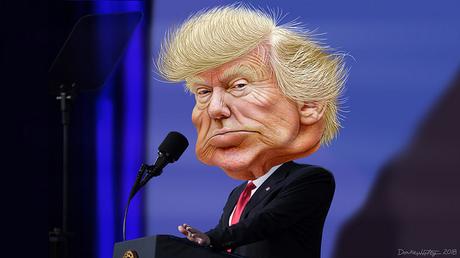 (This caricature of our liar-in-chief is by DonkeyHotey.)
(This caricature of our liar-in-chief is by DonkeyHotey.)I know the talking heads on cable news are saying the election is not about Donald Trump, but the Congress will be decided on local issues. And I know I sound like a broken record. But the truth as I see it is that this election (more than any other midterm election) is a referendum on the Trump administration. Those who like Trump will vote for Republicans, and those who dislike him (or are scared by him) will vote for Democrats.
To a certain extent, all midterm elections are about the sitting president. But this one takes that to an extreme. And Trump has made it that way by taking credit for everything.
Here's just some of how Dana Milbank describes it in The Washington Post:
President Trump is getting his wish: It’s all about him. The election, that is. New evidence indicates that the midterm elections in seven weeks will be the clearest referendum on a president in at least 80 years. But while it may delight the narcissistic president that the 2018 midterms are entirely about him, this is precisely what his fellow Republicans were hoping to avoid. With Trump’s support at historic lows — 60 percent overall disapprove of his performance, including 59 percent of independents — Republicans scrambling to hold the House and Senate have been struggling in vain to make the election about other issues: tax cuts, Democrats’ personal foibles — anything to avoid the election being about Trump. This has failed, bigly. Midterm elections have generally come to be seen as the electorate’s reaction to a presidency. But this one is on a whole different level. “In no previous election,” Gary Jacobson, a University of California political scientist who crunched the numbers, tells me, “has the linkage between opinions of the president and how people are likely to vote been as strong as this time.” Jacobson’s research goes back to the 1930s, before which there was no polling and therefore no ability to compare. Jacobson, who presented his findings to the American Political Science Association recently and provided me with updated data, found in 93.1 percent of cases this year, voters’ approval or disapproval of the president is correlated with their planned votes for or against the president’s party in House races. That’s an all-time high. It averaged 86 percent in recent elections, 74 percent in the 1980s and 1990s. And it’s more than a casual correlation. Using regression analysis, Jacobson determined that for every percentage point movement in Trump’s job approval rating, support for Republican House candidates in the midterm elections move by 0.75 percentage points — the highest effect ever seen. For Barack Obama, it was 0.50 percentage points. For George W. Bush and Bill Clinton, closer to 0.25 percentage points. There isn’t as much data about Senate voting, but the relationship has been virtually identical. This has been caused by a combination of historical trends and Trump’s uniquely polarizing status. Jacobson, working with data from Gallup, the American National Election Studies and others, writes that as recently as 1990, there was only a 31-point difference between how Republicans and Democrats rated the president’s performance in midterm election years. That jumped to a roughly 70-point gap during the midterms of 2006, 2010 and 2014. This year? Seventy-eight percent. At the same time, party loyalty — the tendency of Democrats and Republicans to vote for their own party’s congressional candidate — has grown from the mid-70s in the 1980s to 90 percent in the past decade. This year? Ninety-six percent.

